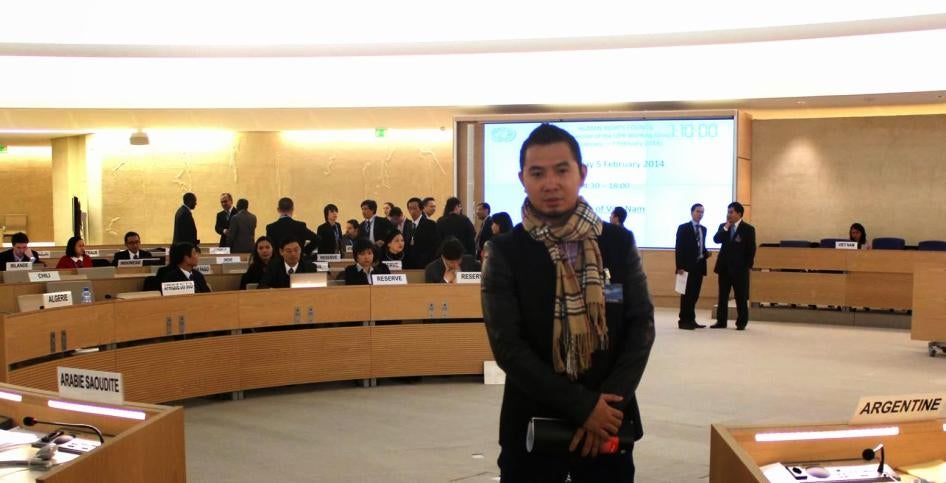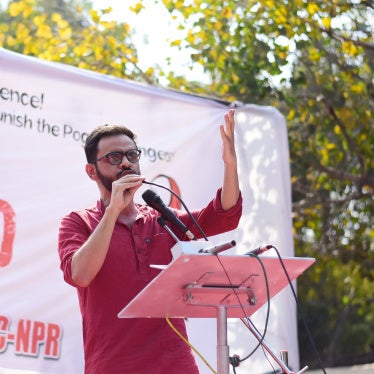Update: On May 25, 2023, a court in Da Nang sentenced Bui Tuan Lam to five years and six months in prison and four years of probation after his release.
(Bangkok) – A Vietnamese rights activist, Bui Tuan Lam, is scheduled to go on trial on May 25, 2023, on charges of propaganda against the state for his online criticism of the government. If the court convicts him at his trial on May 25, 2023, he faces up to 12 years in prison under article 117(1) of the penal code. The authorities should drop the charges against him.
Over the past decade, Bui Tuan Lam has publicly advocated democracy for Vietnam. He has said that his “ideology and passion” is “to advocate for freedom, democracy and human rights,” and he expressed longing for “human rights to become universal in his homeland.”
“The Vietnamese authorities deem just about anything as ‘propaganda against the state’ to crack down on activists and dissidents,” said Phil Robertson, deputy Asia director at Human Rights Watch. “The Vietnamese government should abolish rights-abusing article 117 of the penal code and stop prosecuting Bui Tuan Lam and others for criticizing the Vietnamese Communist Party.”
Bui Tuan Lam (also known as Peter Lam Bui or Green Onion Bae), 39, became famous in November 2021 for making a parody video of himself spreading green onion on noodle soup, imitating the celebrity chef Salt Bae, who was seen spreading salt over a US$2,000 gold-encrusted steak and spoon-feeding it to Vietnam’s public security minister, To Lam. Ironically, the minister was visiting London as the head of the government delegation to the global climate change conference, COP26. Police summoned and interrogated Bui Tuan Lam several times, and pressured him to close his noodle soup shop which he did for a few days.
He has participated in many anti-China and pro-environment protests over the years. He once joined the now-dormant No-U FC (No U-line Football Club), a soccer team whose members made it their cause to speak out against China’s territorial claims on maritime areas claimed by Vietnam.
He participated in a No-U humanitarian group to provide assistance to impoverished people in remote areas and victims of natural disasters in Vietnam. In April 2020, the Da Nang police harassed and threatened him for providing food relief to local people during the Covid-19 pandemic. Bui Tuan Lam frequently voiced support for fellow activists, political prisoners, and their families.
In February 2014, Bui Tuan Lam travelled to Geneva to participate in a civil society campaign for human rights during Vietnam’s Universal Periodic Review session at the United Nations Human Rights Council. Facing the risk of retaliation from Vietnamese government officials, he prepared a video before he returned to Vietnam, asking supporters to release it if he was detained and calling on them to continue campaigning for freedom and democracy. When he returned to Vietnam, police detained him at the airport, interrogated him for hours and confiscated his passport. He has not been allowed to leave Vietnam since then.
In April 2014, when Bui Tuan Lam was returning from visiting the house of the former political prisoner Huynh Ngoc Tuan, men in civilian clothes assaulted and beat him brutally.
The police have frequently harassed and threatened him for his activism. When he lived in Ho Chi Minh City working as an advertising designer, the police pressured his landlord to evict him and compelled his employer to fire him. Bui Tuan Lam was forced to move back to his hometown, Da Nang, where he opened a sidewalk food stand to earn a living.
The police accusation against him in the current case states that: “since 2013, Bui Tuan Lam frequently uses the social network to post many articles and videos and livestream with contents that distort the guidelines and policies of the Party and the State, supporting activities that oppose the Party and the State. In addition, Bui Tuan Lam published and shared articles that insult leaders, and the honor and reputation of law enforcement individuals and organizations, with the desire and purpose of changing the regime of the Socialist Republic of Vietnam, sowing confusion and anger among the people.”
On April 6, 2023, the police informed his defense lawyer that the investigation had been completed, and his case had been transferred to the People’s Procuracy of Da Nang, which acts as a prosecutor. However, on April 18, his defense lawyer received a document dated April 12 from the People’s Procuracy, claiming that Bui Tuan Lam refused to be represented by a lawyer. Le Thanh Lam, Bui Tuan Lam’s wife, then filed a petition demanding a meeting with her husband to hear directly from him whether he waived his right to have a defense lawyer.
On April 24, the procuracy issued a notice to allow lawyers to represent Bui Tuan Lam. But when lawyer Le Dinh Viet requested a meeting with Bui Tuan Lam later that day, the authorities rejected his request on the grounds that the court needed more time to examine the case. It was not until May 8 that the authorities allowed defense lawyers to meet with Bui Tuan Lam.
“Beyond the usual due process violations, the case against Bui Tuan Lam has been further marred by the authorities’ bogus claims that he waived his right to a defense lawyer after holding him incommunicado for more than seven months,” Robertson said. “Vietnam should promptly amend its criminal procedure code to ensure all detainees have full access to the legal counsel of their choice upon arrest.”
In the indictment, the Da Nang People’s Procuracy accused Bui Tuan Lam of publishing 19 posts on Facebook between April 17, 2020, and July 29, 2021, and 25 videos on YouTube between December 4, 2021, and September 7, 2022, that “affect the confidence of the people about the state’s leadership.”
Among these are Facebook posts of a letter by the prominent human rights blogger Pham Doan Trang published on the day she was arrested, in which she urged people to advocate for genuinely free elections in Vietnam and promoted her books criticizing the government, including Politics for the Masses, A Handbook for Families of Prisoners, On Non-violent Resistance Techniques, Politics of a Police State, and Citizen Journalism. The authorities said that Pham Doan Trang’s letter violates the law because “it has the content of calling for struggling for freedom and democracy based on Pham Doan Trang’s way of thinking.” The indictment also lists two video clips of her trial.
Among the videos listed in the indictment are five recorded songs. Three are performances of a human rights song, “Return to the People,” written by the former political prisoner, Viet Khang. The lyrics open with, “Return to the people the rights to freedom; human rights; the rights to see, to hear, to speak; the rights to choose the truth and freedom; the rights to remove a dictatorship.” The second song, “Where is my Vietnam?” also by Viet Khang, contains content opposing China. The third is a famous anti-war song, “Mother’s Legacy,” written in 1965 by Vietnam’s most beloved song composer, the late Trinh Cong Son.
“The list of posts and videos listed as ‘evidence’ of Bui Tuan Lam’s ‘crimes’ shows the extreme lengths to which the Vietnamese go to block any sort of online criticism of the government,” Robertson said. “For the Vietnamese leadership, even songs are a threat to their monopoly of power.”









